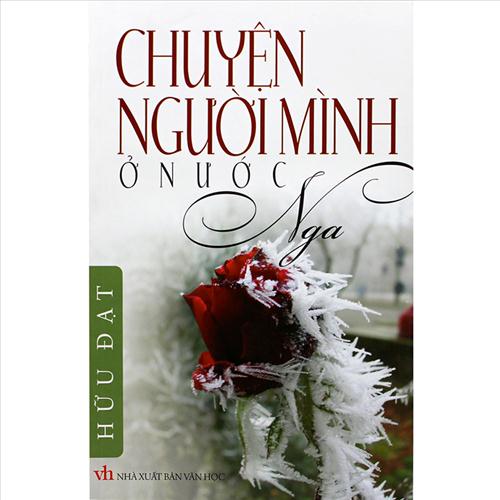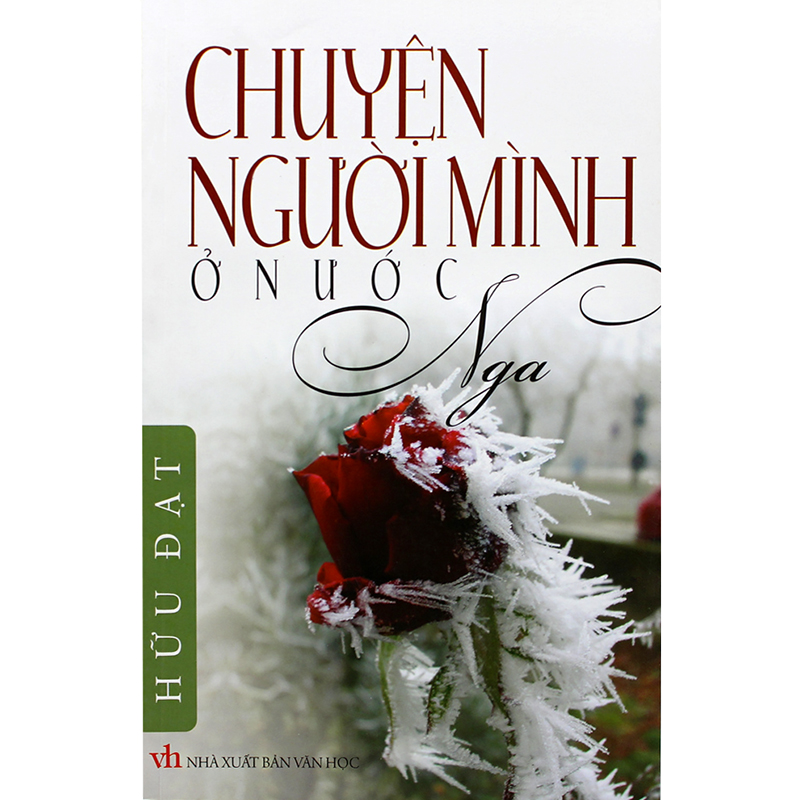
The picture of life of the Vietnamese community in the Soviet Union appears in the novel through the main and supporting characters. Each person has their own style, however, ten out of ten cannot be perfect, because "no one is perfect". The Vietnamese community abroad, especially in the Soviet Union (formerly) and Russia today, reveals "Achilles' heel" that is difficult to conceal - the slovenliness, disintegration, and looseness of a "crowd" that focuses heavily on making a living but lightly on improving human nature, a crowd that seems very united and strong when in the country but clearly shows itself to be very disintegrated and weak when in a foreign land. Because of making a living, sometimes they lose their integrity and personality. And most importantly, cultural behavior, when using the culture of the village to face and dialogue with the culture of industrial civilization. That picture of life is shown through people, through characters of literature/novel. Characters refract ideological themes, moreover, characters also bear the mark of the style of the writer, its spiritual father. InStories of our people in Russia, I pay attention to the pair of characters Hung - Hao, in today's language it is a "perfect couple". This is the main "axis", throughout the work, like a big magnet attracting many relationships, many lines (emotional, economic, world affairs), many other characters far and near. Hung is a soldier, experienced fierce war, tested through "red fire and cold water", was promoted to captain. That means he has a view of war at a tactical level. He was once taken prisoner, and was lucky to be rescued by an officer of the Republic of Vietnam. That person was Lieutenant Minh. The world is round, twenty years later they faced each other on Russian soil in the affairs and business tricks between gangs with generals and commanders fighting for territory and interests. Hung and Minh in the business relationship revealed another flow of life, I call it "underground". In this flow, there is fierce and even brutal competition, only life and death because "the market is a battlefield". I lived in Russia for three years during the decline of the Soviet regime, and knew the smell of the market mechanism in the snow country before being swept away like a flood in my homeland. When Huu Dat wrote about this flow, he was not an observer but somewhat a participant. The fierce things that Hung experienced in the business world through Huu Dat's description, I personally find vivid, real, and sometimes even "passionate about every detail" like the way television advertisements are now. This is a piece of real life that creates an eye-catching effect for readers when receiving the novel.Stories of our people in Russiaby Huu Dat. The money that Vietnamese people earn in foreign lands is full of tears, sometimes even soaked in blood. That is why the novel brings a new understanding of the times, of the people and the political atmosphere of a great and vast country of the past that is inevitably going into ruin. In that storm, the fate of the Vietnamese community is very small, with little future in sight.

But the second stream that creates the depth of the novel is the love stories of Vietnamese people in a foreign land, even though living in the chaos of the times, they still have to follow the eternal law - the law of the heart. How did Vietnamese people feel happy and sad, love and hate, hope and disappointment in the land of white snow and birch? How did they feel greed, anger, love and hate, joy and anger in a longing far from home? To answer this question, we must look to the relationship of the character pair Hung - Hao as mentioned above. Although it is an "extramarital" relationship in the situation of "being apart from husband and wife", it seems to be inconsistent with national tradition, but it still exists objectively. But under the writer's pen, it is sometimes inevitable - it is the meeting of "broken pieces", the healing of emotional wounds that cannot be done in one place but can be done in another. I know that Huu Dat always favors women like Hao, Thu, Luu, Le Thu, etc. in his works. Why? The question is not difficult to answer when it is easy to recognize their disadvantages and sacrifices regardless of their living conditions, whether in Vietnam or abroad, at this time or that time, whether in a small family or in the wider society. They need generosity, protection, and support. I find the novel imbued with a spirit of altruism for the female characters. For Hao, Hung is a source of joy, so every time he leaves the house: "The taxi carrying Hao passes through the spacious boulevards, on both sides are rows of massive houses with almost the same architecture, bringing Hao monotony in emotions and boredom every time he has to go alone without Hung". Only then can we know how important they are to each other, how deeply they exist in each other. I have the feeling that Huu Dat tells other people's stories as if he were telling his own story, writing as if he poured his heart into each sentence. That's just my guess! With this perfect couple, I see that the author has no intention of criticizing or praising, he writes about them as an objective existence, and the right to judge belongs to the reader.
In the novel, there is a poet character Bach Giang who is "taken care of" quite carefully by Huu Dat. Writing about artist characters, Huu Dat shows that he is familiar with them because they are in the same circle as him, a part of his flesh and blood. They are his feelings. Bach Giang has the eccentricities inherent in the artist world in general. He is generous and open-minded like the inherent nature of an artist. But he is not so indifferent to money and business. As the character Hai Tu said: "Researchers have a head, so they do business better than us, that's right." But Bach Giang reveals everything only in excitement and passion for creation. He is a romantic person. But his wife Tuyet is too realistic, often pulling her husband down to reality. I see Huu Dat sympathizing with the poet character Bach Giang. Sometimes even being soulmates with this character. A perceptive person will catch a glimpse of a few features that refract the author's spirit. That's right, writing is a revelation of the subject to a certain extent.
InStories of our people in RussiaI see that Huu Dat intentionally "shows" many characters at the same time with the intention of portraying a "crowd" of his people. Whether they are described in detail like Hung, Hao, Minh, Ba, Bach Giang,.. or are dotted like La Van, Chan, Hoang Giang, Tham, Xoan, Chuan,.. they all have personalities, identities, and situations. They are all worth sharing, sympathizing, and being friends with. They are all like passengers on a train to the promised land. But that promised land is falling apart and when returning to their homeland, each person has a completely different large or small asset. They are similar in that they all accept to commit themselves, to join in the race to change their lives. And in the end, they all return to their homeland. It is true that "a dead fox turns back to the mountain after three years". *
Novel techniques of Huu Dat inStories of our people in RussiaIt is not really modern. It is not “postmodern”, it is not “stream of consciousness”, it is just “returning to the old way”. But it is interesting to read. Why? It turns out that sometimes the traditional writing style has the power to conquer readers. I think both the “story” and “literature” elements create the general appeal of the novel. The story is clear, the story of making a living of Vietnamese people abroad has so many events, so many thrilling “phases”, so many situations, so many moods and dramas, so many ups and downs. So many lucky and unlucky endings. Even tragedies cannot be avoided. As for the writing style, Huu Dat has a clear, easy-to-read and attractive writing style. The story is told through "highlights", necessary "silences", "dynamic" and "static" interspersed, influencing each other to create the "momentum" of the story (for example, the opening situation of the novel, when Hung was lost in his thoughts with Hao, he was knocked out by Minh's wing). One way to keep readers interested in Huu Dat's writing is to combine the description of action and character psychology. Not letting the character purely act, but also not pushing the character to sink into mood, sometimes because of that, falling into inertia. Remember that the life of Vietnamese people in Russia is very "dynamic" but also not lacking in "static". That is the dialectic of nature and society. Hung - Hao, the perfect couple as we see, is taken care of most carefully by Huu Dat, appearing in the work from beginning to end very vividly thanks to their spiritual energy that is evident in both action and mood.
Huu Dat has a special ability when writing dialogue. This can be seen in some of his novels. Huu Dat's dialogues are often subtle and have deep meanings. In this novel, thanks to the dialogue, the pace of the story becomes more tense, more active, the transitions in ideas and paragraphs become more graceful and flexible. But in my opinion, the dialogues of female characters are still the most "eye-catching". An example of this is the quick dialogue between Thu and Hao:
-Even if your husband is an expert like you, he's still happy - Thu made Hao a cup of instant coffee and said - Every year, one trip abroad. My husband covers everything. Life is perfect.
-Hehe - Hao pouted - You thought... you could just wait for that fat guy in my house for Tet. He's so petty, calculating every penny, would he ever think of spending money to take me out?
- Yeah…it seems like a waste. But I think I'm bored with life.
- What? - Thu turned around - What did you say? Are you bored with life? Your husband is an expert. Big house, lots of cars. What more could you dream of?
-Oh - Hao sighed - Human happiness is not just a house or a car. There are so many other things!
This dialogue reveals to the reader the reason why she came to him. She found in Hung a man who was chivalrous, generous, sympathetic and sharing, especially knowing how to cherish Hao like “cherishing Vietnamese feet” according to Bitis’s advertising! Hao realized: “Only after living with Hung did Hao truly realize how meaningless and bland her youth had been (…). Hung had never loved anyone like that. The war life had filtered out countless sorrows so that he could come to Hao with a love that cost the most in life.”
The ending of the novel seems a bit abrupt, making readers feel regretful, even seeming to crave to know a few more stories to have a beginning and an end according to the traditional way of accepting the fate of the characters. Is this perhaps a trick of the writer to "starve the readers"?! Something incomplete can sometimes stimulate people's curiosity, and arouse the imagination in each person. This ending, in my opinion, is effective and good, because it creates associations, and thanks to that, can create echoes for the work./.
Hanoi, July 2015
Author:Bui Viet Thang
Newer news
Older news